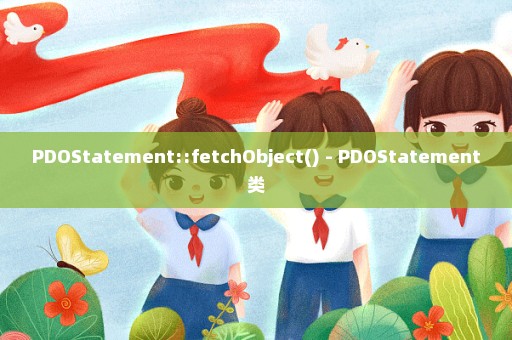PDOStatement::fetchObject() - PDOStatement类
PDOStatement::fetchObject()
(PHP 5 >= 5.1.0, PHP 7, PECL pdo >= 0.2.4)
获取下一行并作为一个对象返回。
说明
PDOStatement::fetchObject([string $class_name= "stdClass"[,array $ctor_args]]): mixed获取下一行并作为一个对象返回。此函数(方法)是使用PDO::FETCH_CLASS或PDO::FETCH_OBJ风格的PDOStatement::fetch()的一种替代。
参数
$class_name
创建类的名称。
$ctor_args此数组的元素被传递给构造函数。
返回值
返回一个属性名对应于列名的所要求类的实例,或者在失败时返回FALSE.
参见
- PDOStatement::fetch() 从结果集中获取下一行
Be warned of the rather unorthodox behavior of PDOStatement::fetchObject() which injects property-values BEFORE invoking the constructor - in other words, if your class initializes property-values to defaults in the constructor, you will be overwriting the values injected by fetchObject() ! A var_dump($this) in your __construct() method will reveal that property-values have been initialized prior to calling your constructor, so be careful. For this reason, I strongly recommend hydrating your objects manually, after retrieving the data as an array, rather than trying to have PDO apply properties directly to your objects. Clearly somebody thought they were being clever here - allowing you to access hydrated property-values from the constructor. Unfortunately, this is just not how OOP works - the constructor, by definition, is the first method called upon construction. If you need to initialize your objects after they have been constructed and hydrated, I suggest your model types implement an interface with an init() method, and you data access layer invoke this method (if implemented) after hydrating.
It should be mentioned that this method can set even non-public properties. It may sound strange but it can actually be very useful when creating an object based on mysql result.
Consider a User class:
fetchObject() doesn't care about properties being public or not. It just passes the result to the object. Output is like:
object(User)#3 (2) {
["id":"User":private]=>
string(1) "1"
["name":"User":private]=>
string(10) "John Smith"
}You can access MySQL tables in an objective way. Suppose you have a table named Users that has fields: UserID, UserName, UserPassword, UserBirthday, you can create a PHP class extending DataObject that is associated with this table: The DataObject class example:
PDOStatement::fetchObject() injects values as string, I needed a conversion type. I did it including settype() function in class constructor Below method that find an user by id and return user object instance: User class with type handling: var_dump() of returned User instance: 'objectId' and 'active' are now of the type required
If using a namespaced class, you must provide the fully qualified class name; fetchObject does not seem to know about any "use" statements. This results in a PHP Fatal error: Class 'MyClass' not found...:
鹏仔微信 15129739599 鹏仔QQ344225443 鹏仔前端 pjxi.com 共享博客 sharedbk.com
免责声明:我们致力于保护作者版权,注重分享,当前被刊用文章因无法核实真实出处,未能及时与作者取得联系,或有版权异议的,请联系管理员,我们会立即处理! 部分文章是来自自研大数据AI进行生成,内容摘自(百度百科,百度知道,头条百科,中国民法典,刑法,牛津词典,新华词典,汉语词典,国家院校,科普平台)等数据,内容仅供学习参考,不准确地方联系删除处理!邮箱:344225443@qq.com)
图片声明:本站部分配图来自网络。本站只作为美观性配图使用,无任何非法侵犯第三方意图,一切解释权归图片著作权方,本站不承担任何责任。如有恶意碰瓷者,必当奉陪到底严惩不贷!
内容声明:本文中引用的各种信息及资料(包括但不限于文字、数据、图表及超链接等)均来源于该信息及资料的相关主体(包括但不限于公司、媒体、协会等机构)的官方网站或公开发表的信息。部分内容参考包括:(百度百科,百度知道,头条百科,中国民法典,刑法,牛津词典,新华词典,汉语词典,国家院校,科普平台)等数据,内容仅供参考使用,不准确地方联系删除处理!本站为非盈利性质站点,本着为中国教育事业出一份力,发布内容不收取任何费用也不接任何广告!)
 百科狗
百科狗



